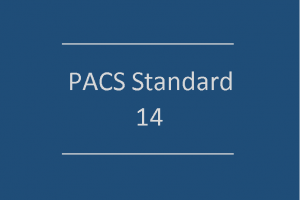

PACS Standard 14:
Enforcement
PACS Standard 14 forms part of GIACC’s Project Anti-Corruption System (PACS), which comprises 15 PACS Standards (see links at foot of this webpage).
Requirements
- Enforcement of contractual remedies against Suppliers and Sub-suppliers: The Project Owner should:
- enforce appropriate contractual remedies against any of its Suppliers which are involved in corruption or which are in breach of their Anti-Corruption Contractual Commitments
- require and ensure that all Suppliers:
- enforce appropriate contractual remedies against any of their Sub-suppliers which are involved in corruption or which are in breach of their Anti-Corruption Contractual Commitments
- require and ensure that their Sub-suppliers do the same in relation to their sub-sub-suppliers.
- Disciplinary action against personnel: The Project Owner should:
- take appropriate disciplinary action against any of its personnel who are involved in corruption or who are in breach of anti-corruption laws and regulations, the Project Procedures, or the Project Code of Conduct
- require and ensure that all Suppliers:
- take appropriate disciplinary action against any of their personnel who are involved in corruption or who are in breach of anti-corruption laws and regulations, the Project Procedures, or the Project Code of Conduct
- require and ensure that their Sub-suppliers do the same in relation to their sub-sub-suppliers.
- Reports to law enforcement body: Where there are reasonable grounds to suspect that a corruption offence may have been committed, the Project Owner should refer the matter to the law enforcement body for investigation and prosecution.
Guidance
G1: Why is it important to enforce remedies for corruption or breach of anti-corruption obligations?
Corruption will only be materially reduced if persons believe that there is a real probability that corruption will be reported, investigated and penalised. If persons are aware that remedies or penalties are not enforced, then there will be no effective deterrent. Consequently, in order to help ensure such enforcement, this PACS Standard:
- requires the Project Owner to enforce anti-corruption remedies against any Supplier which has been involved in corruption or has breached an Anti-Corruption Contractual Commitment, and to ensure that this enforcement is carried out by Suppliers and Sub-suppliers down the contractual chain
- requires the Project Owner to take disciplinary action against any of its personnel who have been involved in corruption or have breached anti-corruption laws and regulations, the Project Procedures or the Project Code of Conduct, and to ensure that similar disciplinary action against personnel is carried out by Suppliers and Sub-suppliers down the contractual chain.
G2: What are the anti-corruption contractual commitments and obligations which should be enforced?
- Suppliers and Sub-suppliers: The relevant Anti-Corruption Contractual Commitments for Suppliers and Sub-suppliers are contained in PACS Standard 4.
- Personnel: The relevant anti-corruption obligations for personnel are contained in the following PACS Standards:
- Project Owner personnel: Paragraph 9 of PACS Standard 1 requires that anti-corruption obligations should be included in conditions of employment for the Project Owner’s personnel. Paragraph 2 of PACS Standard 4 requires the Project Owner to provide a contractual commitment to Suppliers that its personnel will comply with the specified anti-corruption obligations.
- Supplier and Sub-supplier personnel: Paragraph 2 of PACS Standard 4 requires the Supplier to provide a contractual commitment to the Project Owner that its personnel will comply with the specified anti-corruption obligations, and the equivalent provision applies to Sub-suppliers under paragraph 3 of PACS Standard 4.
- All Project personnel: PACS Standard 8 provides that all Project personnel should comply with the Project Code of Conduct.
Links to the other PACS Standards
PS 1: Anti-corruption management of the project
PS 2: Project selection, design and land acquisition
PS 7: Controls for Major Suppliers and Sub-suppliers
PS 13: Reporting and investigation
PS 14: Enforcement
Updated on 1st November 2021
© GIACC